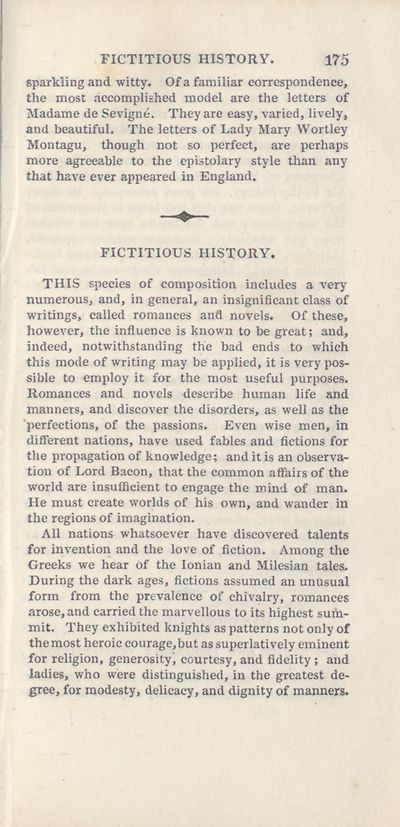Education > Essays on rhetoric
(203)
Download files
Complete book:
Individual page:
Thumbnail gallery: Grid view | List view

FICTITIOUS HISTORY. 175
sparkling and witty. Of a familiar correspondence,
the most accomplished model are the letters of
Madame de Sevigne. They are easy, varied, lively,
and beautiful. The letters of Lady Mary Wortley
Montagu, though not so perfect, are perhaps
more agreeable to the epistolary style than any
that have ever appeared in England.
FICTITIOUS HISTORY.
THIS species of composition includes a very
numerous, and, in general, an insignificant class of
writings, called romances and novels. Of these,
however, the influence is known to be great; and,
indeed, notwithstanding the bad ends to which
this mode of writing may be applied, it is very pos¬
sible to employ it for the most useful purposes.
Romances and novels describe human life and
manners, and discover the disorders, as well as the
perfections, of the passions. Even wise men, in
different nations, have used fables and fictions for
the propagation of knowledge; and it is an observa¬
tion of Lord Bacon, that the common affairs of the
world are insufficient to engage the mind of man.
He must create worlds of his own, and wander in
the regions of imagination.
All nations whatsoever have discovered talents
for invention and the love of fiction. Among the
Greeks we hear of the Ionian and Milesian tales.
During the dark ages, fictions assumed an unusual
form from the prevalence of chivalry, romances
arose, and carried the marvellous to its highest sum¬
mit. They exhibited knights as patterns not only of
the most heroic courage, but as superlatively eminent
for religion, generosity, courtesy, and fidelity ; and
ladies, who were distinguished, in the greatest de¬
gree, for modesty, delicacy, and dignity of manners.
sparkling and witty. Of a familiar correspondence,
the most accomplished model are the letters of
Madame de Sevigne. They are easy, varied, lively,
and beautiful. The letters of Lady Mary Wortley
Montagu, though not so perfect, are perhaps
more agreeable to the epistolary style than any
that have ever appeared in England.
FICTITIOUS HISTORY.
THIS species of composition includes a very
numerous, and, in general, an insignificant class of
writings, called romances and novels. Of these,
however, the influence is known to be great; and,
indeed, notwithstanding the bad ends to which
this mode of writing may be applied, it is very pos¬
sible to employ it for the most useful purposes.
Romances and novels describe human life and
manners, and discover the disorders, as well as the
perfections, of the passions. Even wise men, in
different nations, have used fables and fictions for
the propagation of knowledge; and it is an observa¬
tion of Lord Bacon, that the common affairs of the
world are insufficient to engage the mind of man.
He must create worlds of his own, and wander in
the regions of imagination.
All nations whatsoever have discovered talents
for invention and the love of fiction. Among the
Greeks we hear of the Ionian and Milesian tales.
During the dark ages, fictions assumed an unusual
form from the prevalence of chivalry, romances
arose, and carried the marvellous to its highest sum¬
mit. They exhibited knights as patterns not only of
the most heroic courage, but as superlatively eminent
for religion, generosity, courtesy, and fidelity ; and
ladies, who were distinguished, in the greatest de¬
gree, for modesty, delicacy, and dignity of manners.
Set display mode to:
![]() Universal Viewer |
Universal Viewer | ![]() Mirador |
Large image | Transcription
Mirador |
Large image | Transcription
| Antiquarian books of Scotland > Education > Essays on rhetoric > (203) |
|---|
| Permanent URL | https://digital.nls.uk/113761928 |
|---|
| Description | Thousands of printed books from the Antiquarian Books of Scotland collection which dates from 1641 to the 1980s. The collection consists of 14,800 books which were published in Scotland or have a Scottish connection, e.g. through the author, printer or owner. Subjects covered include sport, education, diseases, adventure, occupations, Jacobites, politics and religion. Among the 29 languages represented are English, Gaelic, Italian, French, Russian and Swedish. |
|---|

